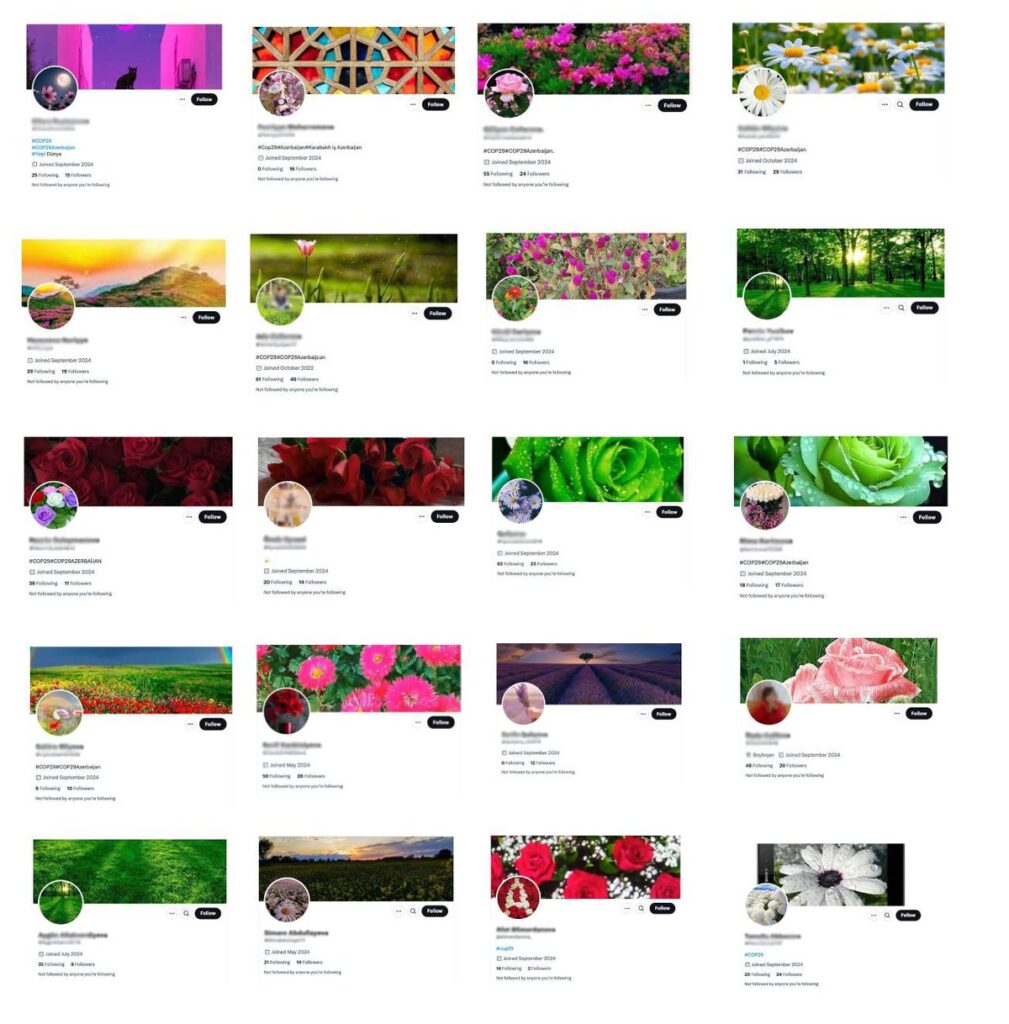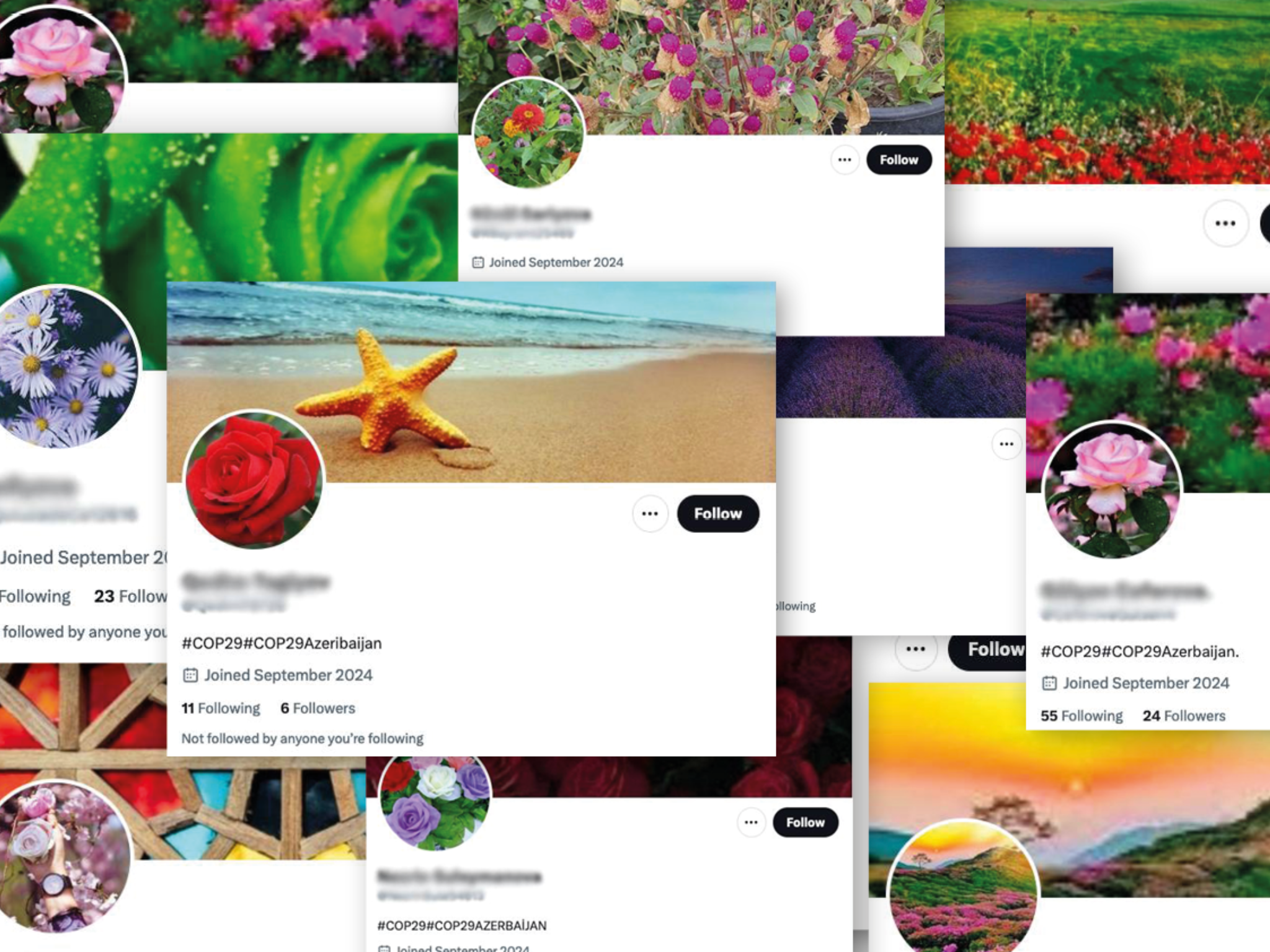‘Suspicious’ Social Media Accounts Are Promoting Azerbaijan In Face of Criticism Ahead of COP29
5 Mins Read
As COP29 approaches, an investigation has found dozens of “suspicious”, likely fake accounts on X that are promoting Azerbaijan, the heavily criticised host of the UN climate summit.
Two weeks before world leaders convene in Baku for the world’s most prominent climate conference, the critical spotlight on the host nation is growing.
Azerbaijan, a petrostate with an alarming human rights and press freedom record, has come under fierce scrutiny for its role as the host of COP29, the UN’s annual climate summit.
But dozens of “suspicious” accounts on X (formerly Twitter) have been found to be promoting the government’s official messages to distract from the negativity, according to a new investigation by Global Witness.
The country, one of the top 10 oil states globally, makes two-thirds of its revenue from oil and gas production. And it’s looking to expand gas production by 50% over the next decade, at a time when climate scientists are imploring governments to divest and phase out the use of fossil fuels – a message that will no doubt be revisited in Baku next month.
Similar-looking accounts retweeting official COP29 posts

Global Witness took inspiration from two similar investigations that uncovered a trove of fake accounts promoting the UAE’s presidency of COP28 last year, which was also mired in controversy given the country’s status as a fossil fuel giant.
Additionally, Azerbaijan has a record of using fake Facebook accounts to target journalists and activists, and bots and troll farms on X to criticise its neighbour and historical rival Armenia, Global Witness said.
The non-profit’s analysis found 71 suspicious accounts with several common characteristics, most of which were set up in July, when seven of the top 10 most engaged posts using #COP29 and #COP29Azerbaijan were critical of the country’s role in the reignited conflict with Armenia over the disputed Nagorno-Karabakh region, which displaced over 100,000 people from their homes.
But by September, the conversation had changed, with each of the top 10 engaged posts with the hashtags coming from the official COP29 Azerbaijan account. The tweets were amplified by the accounts uncovered by Global Witness, which it said “appear to be inauthentic” as they’re “suspiciously similar” to each other.
All 71 accounts have nature-related images as their profile or banner photos, and 93% of them were set up within the last six months. Meanwhile, seven of these accounts have exactly the same images on their profile as another.
These accounts disseminate the same content, mostly retweeting instead of posting their own tweets. In September 70% of these retweets were from the Azerbaijan COP29 account or other official government, party or politician accounts.
The suspicious accounts also often don’t add any commentary on the retweets, instead using hashtags – more than half of tweets in September used #COP29 or #COP29Azerbaijan, while 10% also used the nationalistic #KarabakhIsAzerbaijan hashtag.
Additionally, over half the accounts are connected to six others or more, with most (87%) following at least one other account in the network. Further underlining the coordination between the accounts, they often post in a sequential fashion, with the timing of the tweets suggesting that some accounts could be controlled by one person who takes turns logging in to each of them.

X confirms suspicious accounts and takes action
The analysis suggests that this effort “bears the hallmarks of an astroturfing campaign”, a coordinated attempt to create an impression of grassroots support for Azerbaijan’s presidency of COP29.
But this could also just be the tip of the iceberg, Global Witness said, having uncovered a group of 111 additional accounts that were set up within the last five months, mostly retweet posts from official Azerbaijan COP29 or government accounts, and using the same hashtags – just without sharing the network of nature-related images.
“Azerbaijan is days away from hosting the most important climate event of the year. It’s vitally important that there is space online for a real discussion about what we can expect from a petrostate host,” said Global Witness’s digital threats campaign lead, Ava Lee. “Yet a quick search on the main COP29 hashtags unearthed a network of seemingly inauthentic accounts elevating the Government line. They are replacing rightful criticism with flowery positivity.”
These accounts are drowning out independent critiques of Azerbaijan’s human rights and greenwashing records – the country arrested or sentenced at least 25 journalists and activists in the last year, and ranks 160th out of 180 on the Press Freedom Index.
Global Witness noted that all social media platforms have rules that ban inauthentic behaviour, with X stating users may not use the website “in a manner intended to artificially amplify or suppress information” or attempt to “make accounts or content appear more popular or active than they are”.
The Azerbaijan government and the COP29 organisers did not respond to the investigation when contacted by Global Witness. X, meanwhile, confirmed that the accounts were connected and said it had taken action against the majority of them. But since Elon Musk took over the platform in late 2022, his pledge to crack down on digital manipulation and inauthentic behaviour has been undone by the downsizing of the very teams responsible for doing so.
“This shows X’s consistent underinvestment in moderation efforts online. The platform has a responsibility to facilitate authentic debate, rather than relying on outside investigators to do its Trust and Safety work,” said Lee.
The non-profit is asking X to investigate whether the Azerbaian government is engaged in platform manipulation, particularly ahead of COP29, publicly state who the company thinks is behind the suspicious accounts, and strengthen safety and moderation efforts to prevent crucial debates (like on climate change) from being overtaken by these efforts.



